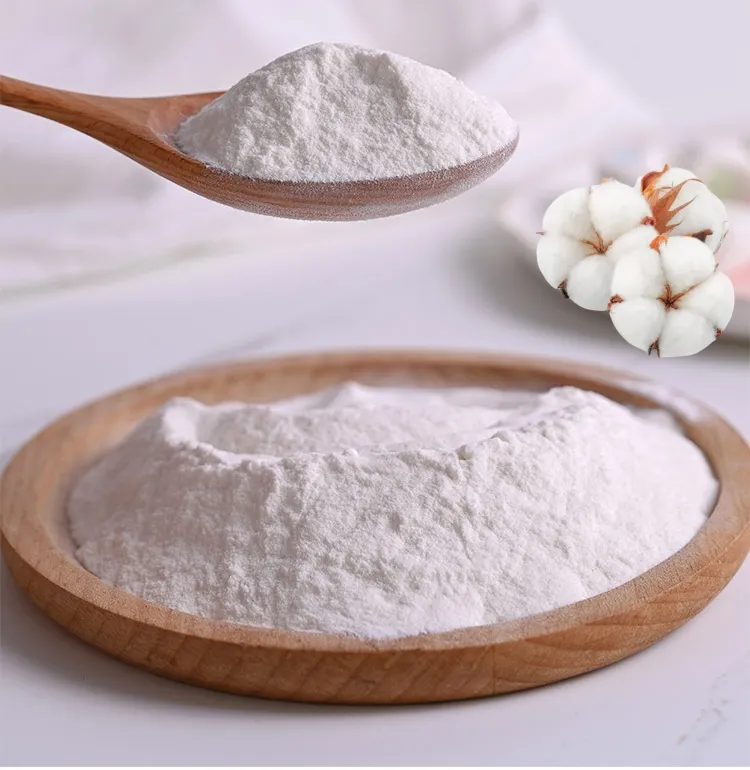
The Growing Demand for CMC Polymers in Modern Industries
Carboxymethyl cellulose (CMC) polymers are making significant strides in a variety of industries, from food production to pharmaceuticals, due to their versatility and sustainable properties. CMC polimeri, CMC karboksimetil tsellyuloza, and karboksimetilselüloz natriy tuzi ushbu innovatsiyalarning boshida turishib, mahsulot samaradorligini oshirish, barqarorlikni yaxshilash va yangi ilovalarni ishga tushirishda asosiy rol o'ynaydi. Ushbu maqola bugungi tez rivojlanayotgan bozorlarda ushbu tsellyuloza hosilalarining amaliy va mashhur qo'llanilishini o'rganadi.

CMC polimeri: sanoat ilovalari uchun kuchli qo'shimcha
CMC polimeri mahsulotlarning yopishqoqligi va barqarorligini o'zgartirishning ajoyib qobiliyati tufayli turli sanoat ilovalarida muhim tarkibiy qismga aylandi. CMC polimeri oziq-ovqat, to'qimachilik, neft burg'ulash va yopishtiruvchi moddalar kabi sanoatda qalinlashtiruvchi vosita, stabilizator va emulsifikator sifatida keng qo'llaniladi. Oziq-ovqat sanoati sohasida, CMC polimeri tuzilishni yaxshilash va ajralishning oldini olish orqali soslar, soslar va muzqaymoqlarning mustahkamligini saqlashga yordam beradi. Neft burg'ilashda, CMC polimeri burg'ulash suyuqliklarini qalinlashtirish, yopishqoqlikni nazorat qilish va suyuqlik yo'qotilishining oldini olish uchun ishlatiladi, bu uni samarali va xavfsiz burg'ulash operatsiyalari uchun hal qiluvchi komponentga aylantiradi. Mahsulot xususiyatlarini yaxshilashda uning ko'p qirrali va samaradorligi CMC polimeri turli sohalardagi ko'plab ilovalarda ajralmas tarkibiy qism.
CMC karboksimetil tsellyuloza: oziq-ovqat va farmatsevtika formulalarini yaxshilash
CMC karboksimetil tsellyuloza ayniqsa, oziq-ovqat va farmatsevtika sanoatidagi roli bilan mashhur bo'lib, u erda keng turdagi mahsulotlarning tuzilishini, barqarorligini va saqlash muddatini yaxshilash uchun ishlatiladi. Oziq-ovqat mahsulotlarini qayta ishlashda, CMC karboksimetil tsellyuloza murabbo, jele va pishirilgan mahsulotlar kabi quyuqlashtiruvchi, jelleştirici va stabilizator sifatida xizmat qiladi. Bu namlikni saqlashga, kristallanishni oldini olishga va mahsulot sifatini barqaror ta'minlashga yordam beradi. Farmatsevtika sohasida, CMC karboksimetil tsellyuloza tabletkalarning bir xilligi va barqarorligini yaxshilaydigan bog'lovchi sifatida planshet formulalarida qo'llaniladi. Uning biologik muvofiqligi va past toksikligi uni dori vositalarini etkazib berish tizimlari va nazorat ostida chiqariladigan formulalar uchun ideal tanlovga aylantiradi. Iste'molchilar yuqori sifatli va uzoq muddatli mahsulotlarni talab qilishlari sababli, CMC karboksimetil tsellyuloza oziq-ovqat va farmatsevtika sanoatida ham ushbu umidlarni qondirishda hal qiluvchi rol o'ynaydi.
Karboksimetilselüloza natriy tuzi: shaxsiy parvarish va kosmetikadagi asosiy tarkibiy qism
Karboksimetilselüloz natriy tuzi Formülasyonlarning tuzilishini, yopishqoqligini va barqarorligini yaxshilash qobiliyati uchun shaxsiy parvarish va kosmetika sanoatida keng qo'llaniladi. Karboksimetilselüloz natriy tuzi shampunlar, konditsionerlar, losonlar va kremlar kabi mahsulotlarda quyuqlashtiruvchi, emulsifikator va stabilizator vazifasini bajaradigan suvda eruvchan polimerdir. Terini parvarish qilishda u silliq, qo'llanilishi oson to'qimalarni yaratishga yordam beradi va mahsulotlarning namlovchi xususiyatlarini oshiradi. Sochni parvarish qilishda, karboksimetilselüloz natriy tuzi konditsionerlarning bir tekis tarqalishini va vaqt o'tishi bilan samarali bo'lishini ta'minlaydi va doimiy foydalanuvchi tajribasini ta'minlaydi. Uning yumshoqligi va toksik emasligi uni tabiiy va ekologik toza go'zallik formulalariga nisbatan o'sib borayotgan tendentsiyaga mos ravishda shaxsiy parvarish mahsulotlaridagi sintetik kimyoviy moddalarga jozibali muqobil qiladi.

CMC derivativlarining barqarorligi va ekologik foydalari
Sanoat yanada barqaror yechimlarga intilayotganda, CMC polimeri, CMC karboksimetil tsellyuloza, and karboksimetilselüloz natriy tuzi muhim ekologik afzalliklarni taqdim etadi. Yog'och xamiri yoki paxta kabi qayta tiklanadigan manbalardan olingan bu tsellyuloza hosilalari biologik parchalanadigan va toksik emas, bu ularni sintetik kimyoviy moddalarga nisbatan ekologik toza variantga aylantiradi. dan foydalanishning ortishi CMC polimeri turli sohalarda neftga asoslangan muqobillarga bo'lgan ishonchni kamaytirishga yordam beradi va yanada barqaror ishlab chiqarish jarayoniga hissa qo'shadi. Bundan tashqari, CMC karboksimetil tsellyuloza ko'pincha biologik parchalanadigan oziq-ovqat mahsulotlarini qadoqlash va shaxsiy parvarishlash mahsulotlarida qo'llaniladi, bu bir martalik plastmassalarning atrof-muhitga ta'sirini kamaytiradi. Korxonalar va iste'molchilar ekologik barqarorlik haqida ko'proq ongli bo'lishlari sababli, ularning roli CMC polimeri va uning hosilalari ahamiyatini oshirishda davom etadi.
Innovatsiyalar va tadqiqotlarda CMC derivativlarining kelajagi
ning salohiyati CMC polimeri, CMC karboksimetil tsellyuloza, and karboksimetilselüloz natriy tuzi ularning joriy ilovalaridan ancha kengaydi. Davom etilayotgan tadqiqotlar ilg'or texnologiyalar va yangi sanoatlarda ushbu tsellyuloza hosilalari uchun yangi imkoniyatlarni ochib beradi. Masalan, CMC polimeri 3D bosib chiqarishda foydalanish uchun o'rganilmoqda, bu erda uning noyob reologik xususiyatlari bosib chiqarish jarayoni va materialning ishlashini yaxshilashi mumkin. Tibbiyot sohasida, CMC karboksimetil tsellyuloza yaralarni bog'lash, dori-darmonlarni etkazib berish tizimlari va to'qimalar muhandisligida foydalanish uchun o'rganilmoqda, bu esa bemorlarni parvarish qilishni yaxshilash uchun ajoyib imkoniyatlarni taqdim etadi. Doimiy innovatsiyalar va tadqiqotlar bilan, karboksimetilselüloz natriy tuzi and other CMC hosilalari turli sohalarda barqaror va yuqori samarali materiallar kelajagini shakllantirishda tobora muhim rol o'ynashi shubhasiz.
In conclusion, CMC polimeri, CMC karboksimetil tsellyuloza, and karboksimetilselüloz natriy tuzi mahsulotlarning funksionalligi va barqarorligini oshirish orqali ko'plab sohalarni o'zgartirmoqda. Oziq-ovqat va farmatsevtika mahsulotlarining tuzilishi va barqarorligini yaxshilashdan shaxsiy parvarish va qadoqlashda ekologik toza echimlarni taqdim etishgacha, CMC hosilalari tengsiz ko'p qirralilikni taklif qiladi. Barqaror va yuqori samarali materiallarga talab ortib borayotganligi sababli, CMC polimerlari yanada samarali va ekologik jihatdan mas'uliyatli mahsulotlarni ishlab chiqishga hissa qo'shib, innovatsiyalarning oldingi safida qoladi.
-
Wholesale Water Reducing Admixture for Special Cement: Advancing Concrete Technology with Polycarboxylate SuperplasticizersNewsJul.24,2025
-
Water Reducing Admixtures: Enhancing Concrete Quality with Polycarboxylate TechnologyNewsJul.24,2025
-
Hydroxypropyl Starch and Hydroxyethyl Starch: Multifunctional Ingredients in Food, Medicine, and CosmeticsNewsJul.24,2025
-
Exploring Water Reducing Admixture Types: The Role of Polycarboxylate Ether in Modern ConcreteNewsJul.24,2025
-
Comprehensive Guide to Antifoaming Agents and Defoaming Solutions Across IndustriesNewsJul.24,2025
-
A Complete Guide to Antifoaming Agents: Types, Applications, and Industry UsesNewsJul.24,2025





















